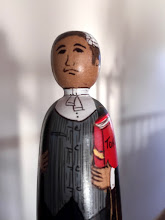
How do you greet a killer? Law school does not prepare you for it. Nor does the bar practice course or pupillage. For most barristers this is not a deficiency in the learning because the likelihood of acting for a killer is small. However for criminal defence barristers, especially those who achieve some seniority, the likelihood becomes certainty.
What do you do when you finally meet that rarest of beasts, the human being who has taken the life of another.
This is a defence counsel's dilemma; not one shared by prosecutors. A senior prosecutor might prosecute dozens of people accused of
murder or manslaughter, but paradoxically will never actually meet one. They
will see them of course, sitting behind thick glass in the dock with a police or
corrections officer nearby. They will point to them, talk about them. Some will
mock and deride them, but they will never meet them. What they know of them comes
from the facts of the case, the evidence of others and sometimes the accused’s
recorded interview with police. No. The opportunity to meet a killer is
reserved for those who investigate crime or defend those accused of it.
 |
| Personality, circumstances and dumb luck ... |
This places defence counsel in a privileged position, even if the experience itself does not always feel like a privilege. So how is it done? How do you greet a killer? Lay readers may expect the answer to be ‘cautiously’. That may be true but not for the reasons you think: those who have killed rarely kill again – serial killers and underworld enforcers aside. Truth is most killings have as much to do with the circumstances prevailing at the time, as they do with the violence of the offender. None of the killers I have met were truly evil. You could meet one at a street party or sausage sizzle and be surprised to learn the truth. Still, their personality, circumstances and dumb luck brought about someone’s death.
So you do greet killers with caution,
not because they are dangerous but because what they have done is terrible,
cannot be undone and carries a high personal price for them too. Many are
without a friend in the world and while you are not their friend, you are charged
with a special duty. In the end you greet them with that duty in mind. You
greet them with earnestness, humanity and a commitment to ensure they are
treated fairly and according to law.


No comments:
Post a Comment